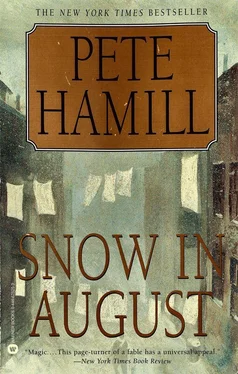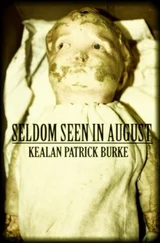Then the rabbi talked about the arrival of the phonograph record in Prague, and Michael saw his friend Judah Hirsch winding up a Victrola and putting the needle on the record and heard him telling his friends that in this new Czechoslovakia, this new Europe, this place free of hatred and war, they would drown together in the music of Dvořák and Mahler and Smetana. Names that Rabbi Hirsch pronounced as if they were saints. Names that Michael did not recognize, could not even imagine how to spell. The rabbi made the boy long to hear their music. He wished his mother would save up and buy a phonograph, even a windup Victrola from the St. Vincent DePaul Society, where things were cheap, so he could hear the music of these men, and Don Giovanni too. And suddenly he realized that the rabbi, who spoke about music as if it were played by God, lived here in the synagogue without a radio, without even the company of Bing Crosby and Benny Goodman.
“Modern, we all were,” the rabbi said, with no music in his voice. “That was the new religion. Modernism.” He paused, and glanced at Michael’s puzzled face. “Too modern for believing in God, we were.”
Such talk made Michael uneasy. He could not imagine how a man of God, a rabbi, could admit that once upon a time he did not believe in God. The priests in Sacred Heart could have no such doubts. They seemed born to be priests, chosen by God himself. Or if they had the doubts, they surely would not tell Michael. But when Rabbi Hirsch spoke of his doubting youth, Michael felt even closer to him, for Michael had his own unspoken doubts, his own questions.
“Eh, you are a boy,” the rabbi said, as if understanding that he had wandered too far from the streets of Prague and the names of buildings and streets and rivers. “I am saying too much of grown-up things.”
He returned to the pictures in the book, like a man examining a map, tracing paths into the New Town Square and showing Michael the astrological clock on the walls of the church, with the apostles moving through two windows every hour, hour after hour, so accurate that even the passing Jewish businessmen would look up and check their pocket watches. Then Michael and young Judah Hirsch were gazing up at the lacy facade of the Palace of Industry. Its clock tower seemed to float in the air above its roof, and the facade’s pattern of intricate iron grills and repeated circles turned yellow in the August sun. Stone flowers sprouted from other buildings and curled around each other in stained-glass windows, and then Michael was on the steps of the National Museum, standing with Judah Hirsch and his father as they looked out over Wenceslas Square and listened to the great leader Masaryk speak about democracy and hope to half a million roaring Czechs.
“How can you remember all these things?” Michael said.
“A Jew, he must watch, and he must remember,” the rabbi said, and smiled in a detached way. “If he wants to live.”
“Like the Irish with the English,” Michael said, remembering the tales his mother told him of British soldiers on the streets of Belfast in 1923, when she was a girl.
“Yes,” the rabbi said. “Like that.”
He turned a few more pages, and there, finally, among the drawings of Old Town and the Jewish Quarter, was the house where he had lived with his father and mother. In a street called U Prasne. In his mind, Michael saw the father’s face: grave, severe, with a trimmed gray beard and pince-nez glasses, checking his pocket watch as he passed the clock where the apostles appeared every hour. Michael was beside Judah Hirsch when his father came home through the winter snows from the clothing store, to slump gray-faced in a chair beside the fire, sitting in the same way that Michael’s mother sat in the living room chair with her book by A. J. Cronin. Then Judah’s mother began to play Mozart on the piano, and the color slowly returned to his father’s face.
“Perfect, it wasn’t,” the rabbi said. “But some nights always I remember it.”
“Do you have pictures of them?”
“All lost.”
“Your mother—”
“Home from school I corned, came , one day, and she is gone,” the rabbi said. “Clothes gone. Jewelry gone. To Vienna, they tell to me. My father that night… he said never again her name is to be said in the house. Thirteen years old I am at this time. In bed, when I finished crying, I heared him in his room, crying too. And never again we say her name.”
“I’m sorry, Rabbi. I didn’t mean to—”
“Is okay. In the life, worst things happen.”
That day, the rabbi told no more stories of Prague. He closed the book and returned it to its shelf and then asked Michael for the latest news about Jackie Robinson.
But at home in the darkness of his room, Michael wondered what it must be like to have your mother disappear, her name erased from all conversation. He could not conceive of his mother leaving his father and going off to Boston or Chicago or the Bronx, never to return. He imagined himself as the rabbi when he was a boy, Judah Hirsch lying in his room in Prague, knowing he would never see his mother again. And knew that Judah Hirsch must have felt the way Michael felt that night in early 1945, after the two soldiers had come up the stairs to their door and talked to his mother, and she had wept without control for the first and last time, and then had to tell the boy that his father wasn’t coming home.
That was only two years ago. It seemed like a hundred. He had bawled like a baby that night, and she had to console him, and hug him, and tell him that someday he would see his father in Heaven. And she told him that he must pray for his father, Private Tommy Devlin of the United States Army, God rest his soul, and offer up his own pain for the souls in Purgatory. But he had prayed for his father every day during the war and still he had died, so Michael did not know why he must keep praying for him. After all, he said to his mother, Daddy can’t be in Purgatory: he died for his country. But she said they must still pray for him, and if Private Tommy Devlin of the United States Army didn’t need the prayers he would give them to someone who had no prayers at all. There were orphans who died in the war, and babies who had never been baptized, and Jews and Chinese and Russians. All sorts of people are dying in this awful war, she said, and we must pray for all of them.
When he was finished crying, his mother dried his face and told him that now he must be the man in the family, that he must not show his grief to strangers, that they must keep their feelings behind the door. And he had done that, refusing to ask for pity from his friends, embarrassed when a teacher at school told the class that they must pray for Michael Devlin’s father, who had died in the war.
But alone behind the door of his room, he would make his father come to life again, with his muscled arms, and his deep voice, and his booming laugh. He would hear him sing. He would walk with him in the park and see a flock of robins. He would sit with him in the balcony of the Grandview. And when he had remembered all the Sticky stories his father had told him, Michael would invent others. He would hit a soft grounder past second base, and Sticky would appear and he would ride the great dog around the bases. A bully would wrestle him to the ground in the schoolyard, and Sticky would seize the bully by the belt and hurl him fifty feet. He would see his father as alone as Custer, surrounded by Germans in the whirling snows of Belgium, and through the forest Sticky would come running, to snatch him away and take him home to Brooklyn.
Michael did not cry in front of others, and his mother was his strongest model: he had never seen her cry again. On this night more than two years after she had last cried, as he thought about the somber voice of Rabbi Hirsch when he explained his own mother’s departure, Michael was glad he had come to know this strange bearded man. The rabbi did not cry. The rabbi did not ask for pity. At least not in front of others.
Читать дальше












